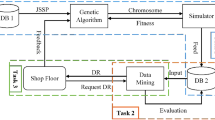Abstract
This paper introduces a novel methodology for generating scheduling rules using a data-driven approach. We show how to use data mining to discover previously unknown dispatching rules by applying the learning algorithms directly to production data. This approach involves preprocessing of historic scheduling data into an appropriate data file, discovery of key scheduling concepts, and representation of the data mining results in a way that enables its use for job scheduling. We also consider how by using this new approach unexpected knowledge and insights can be obtained, in a manner that would not be possible if an explicit model of the system or the basic scheduling rules had to be obtained beforehand. All of our results are illustrated via numerical examples and experiments on simulated data.
Similar content being viewed by others
References
Agrawal, R., T. Imielinski, and A. Swami, “Mining association rules between sets of items in large databases,” in Proceedings of the 1993 ACM-SIGMOD International Conference on Management of Data, 1993.
Aytug, H., S. Bhattacharyya, G. J. Koehler, and J. L. Snowdon, “A review of machine learning in scheduling,” IEEE Transactions on Engineering Management, 41(2), 165–171 (1994).
Bowden, R. and S. F. Bullington, “Development of manufacturing control strategies using unsupervised machine learning,” IIE Transactions, 28, 319–331 (1996).
Chen, C. C. and Y. Yih, “Identifying attributes for knowledge-based development in dynamic scheduling environments,” International Journal of Production Research, 34(6), 1739–1755 (1996).
Deshpande, M. and G. Karypis, “Using conjunction of attribute values for classification,” CIKM'02, Nov. 4–9, McLean, VA, 356–364 (2002).
Geiger, C. D., R. Uzsoy, and H. Aytug, “Autonomous learning of effective dispatch policies for flowshop scheduling problems,” in Proceedings of the Industrial Engineering Research Conference (IERC'03) (2003).
Hestermann, C. and M. Wolber, “A comparison between operations research-models and real world scheduling problems,” The European Conference on Intelligent Management Systems in Operations; University of Salford, U.K., 25–26 March 1997.
Jain, A. S. and S. Meeran, “Job-shop scheduling using neural networks,” International Journal of Production Research, 36(5), 1249–1272 (1998).
Kanet, J. J. and H. H. Adelsberger, “Expert systems in production scheduling,” European Journal of Operational Research, 29, 51–59 (1987).
Kim, C.-O., H.-S. Min, and Y. Yih, “Integration of inductive learning and neural networks for multi-objective FMS scheduling,“ International Journal of Production Research, 36(9), 2497–2509 (1998).
Kusiak, A. and M. Chen, “Expert systems for planning and scheduling manufacturing systems,” European Journal of Operational Research, 34, 113–130 (1988).
Lee, C.-Y., S. Piramuthu, and Y.-K. Tsai, “Job shop scheduling with a genetic algorithm and machine learning,” International Journal of Production Research, 35(4), 1171–1191 (1997).
Lesh, N., M. J. Zaki, and M. Ogihara, “Mining features for sequence classification,” in 5th ACM SIGKDD International Conference on Knowledge Discovery and Data Mining (1999).
Li, D.-C. and I.-S. She, “Using unsupervised learning technologies to induce scheduling knowledge for FMSs,” International Journal of Production Research, 32(9), 2187–2199 (1994).
Min, H.-S., Y. Yih, and C.-O. Kim, “A competitive neural network approach to multi-objective FMS scheduling,” International Journal of Production Research, 36(7), 1749–1765 (1998).
Nakasuka, S. and T. Yoshida, “Dynamic scheduling system utilizing machine learning as a knowledge acquisition tool,” International Journal of Production Research, 30(2), 411–431 (1992).
Noronha, S. J. and V. V. S. Sarma, “Knowledge-based approaches for scheduling problems: A survey,” IEEE Transactions on Knowledge and Data Engineering, 3(2), 160–171 (1991).
Pinedo, M., Scheduling: Theory, Algorithms and Systems, Prentice Hall, 1995.
Piramuthu, S., N. Raman, and M. J. Shaw, “Learning-based scheduling in a flexible manufacturing flow line,” IEEE Transactions on Engineering Management, 41(2), 172–182 (1994).
Piramuthu, S., N. Raman, M. J. Shaw, and S. Park, “Integration of simulation modeling and inductive learning in an adaptive decision support system,” Decision Support Systems, 9, 127–142 (1993).
Priore, P., D. De La Fuente, A. Gomez, and J. Puente, “A review of machine learning in dynamic scheduling of flexible manufacturing systems,” Artificial Intelligence for Engineering Design, Analysis and Manufacturing, 15, 251–264 (2001).
Quinlan, J. R., C4.5: Programs for Machine Learning. Morgan Kaufmann, San Mateo, CA, 1993.
Shaw, M. J., S. Park, and N. Raman, “Intelligent scheduling with machine learning capabilities: The induction of scheduling knowledge,” IIE Transactions, 24(2), 156–168 (1992).
Shaw, M. J. and A. B. Whinston, “An artificial intelligence approach to the scheduling of flexible manufacturing systems,” IIE Transactions, 21(2), 170–183 (1989).
Wiers, V. C. S., “A Review of the Applicability of OR and AI Scheduling Techniques in Practice,” OMEGA - The International Journal of Management Science, 25(2), 145–153 (1997).
Author information
Authors and Affiliations
Corresponding author
Rights and permissions
About this article
Cite this article
Li, X., Olafsson, S. Discovering Dispatching Rules Using Data Mining. J Sched 8, 515–527 (2005). https://doi.org/10.1007/s10951-005-4781-0
Issue Date:
DOI: https://doi.org/10.1007/s10951-005-4781-0




